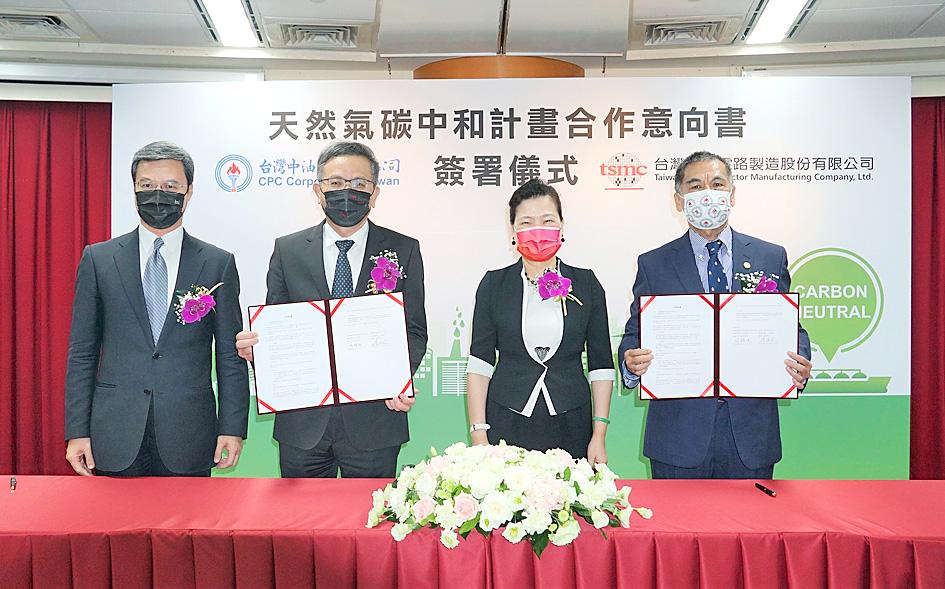CPC Corp, Taiwan (CPC, 台灣中油) on Thursday signed a memorandum of understanding with Taiwan Semiconductor Manufacturing Co (TSMC, 台積電) for a plan to cooperate over the supply of “carbon neutral” liquefied natural gas (LNG).
Speaking at the signing ceremony, Minister of Economic Affairs Wang Mei-hua (王美花) said the agreement between CPC and TSMC to use carbon neutral LNG is a step in the right direction toward Taiwan’s ambitions to achieve net-zero carbon emissions by 2050.
“Let’s take this chance to encourage other companies in Taiwan to realize the green supply chain together,” Wang said.

Photo: Huang Pei-chun, Taipei Times
CPC receives carbon neutral LNG from oil companies such as Royal Dutch Shell PLC, and the company is to use the British Standards Institutions’ PAS 2060 framework to show its results in carbon neutrality and reducing emissions.
“As a major importer of LNG, CPC has a duty to keep importing carbon neutral LNG as a part of our energy transition,” CPC president Lee Shun-chin (李順欽) said. “The provision of carbon neutral natural gas products will help domestic manufacturers meet the decarbonization requirements set by Europe and the US.”
J.K. Lin (林錦坤), senior vice president of information technology, materials and risk management at TSMC, said the chipmaker requested carbon neutral LNG products at the start of the year.
“As the world’s leading semiconductor company, TSMC has been an active promoter of green manufacturing,” Lin said, “In addition to pursuing the use of renewables, we’ve asked for carbon-neutral products from CPC.”

Anna Bhobho, a 31-year-old housewife from rural Zimbabwe, was once a silent observer in her home, excluded from financial and family decisionmaking in the deeply patriarchal society. Today, she is a driver of change in her village, thanks to an electric tricycle she owns. In many parts of rural sub-Saharan Africa, women have long been excluded from mainstream economic activities such as operating public transportation. However, three-wheelers powered by green energy are reversing that trend, offering financial opportunities and a newfound sense of importance. “My husband now looks up to me to take care of a large chunk of expenses,

SECTOR LEADER: TSMC can increase capacity by as much as 20 percent or more in the advanced node part of the foundry market by 2030, an analyst said Taiwan Semiconductor Manufacturing Co (TSMC, 台積電) is expected to lead its peers in the advanced 2-nanometer process technology, despite competition from Samsung Electronics Co and Intel Corp, TrendForce Corp analyst Joanne Chiao (喬安) said. TSMC’s sophisticated products and its large production scale are expected to allow the company to continue dominating the global 2-nanometer process market this year, Chiao said. The world’s largest contract chipmaker is scheduled to begin mass production of chips made on the 2-nanometer process in its Hsinchu fab in the second half of this year. It would also hold a ceremony on Monday next week to

TECH CLUSTER: The US company’s new office is in the Shalun Smart Green Energy Science City, a new AI industry base and cybersecurity hub in southern Taiwan US chip designer Advanced Micro Devices Inc (AMD) yesterday launched an office in Tainan’s Gueiren District (歸仁), marking a significant milestone in the development of southern Taiwan’s artificial intelligence (AI) industry, the Tainan City Government said in a statement. AMD Taiwan general manager Vincent Chern (陳民皓) presided over the opening ceremony for the company’s new office at the Shalun Smart Green Energy Science City (沙崙智慧綠能科學城), a new AI industry base and cybersecurity hub in southern Taiwan. Facilities in the new office include an information processing center, and a research and development (R&D) center, the Tainan Economic Development Bureau said. The Ministry

ADVERSARIES: The new list includes 11 entities in China and one in Taiwan, which is a local branch of Chinese cloud computing firm Inspur Group The US added dozens of entities to a trade blacklist on Tuesday, the US Department of Commerce said, in part to disrupt Beijing’s artificial intelligence (AI) and advanced computing capabilities. The action affects 80 entities from countries including China, the United Arab Emirates and Iran, with the commerce department citing their “activities contrary to US national security and foreign policy.” Those added to the “entity list” are restricted from obtaining US items and technologies without government authorization. “We will not allow adversaries to exploit American technology to bolster their own militaries and threaten American lives,” US Secretary of Commerce Howard Lutnick said. The entities